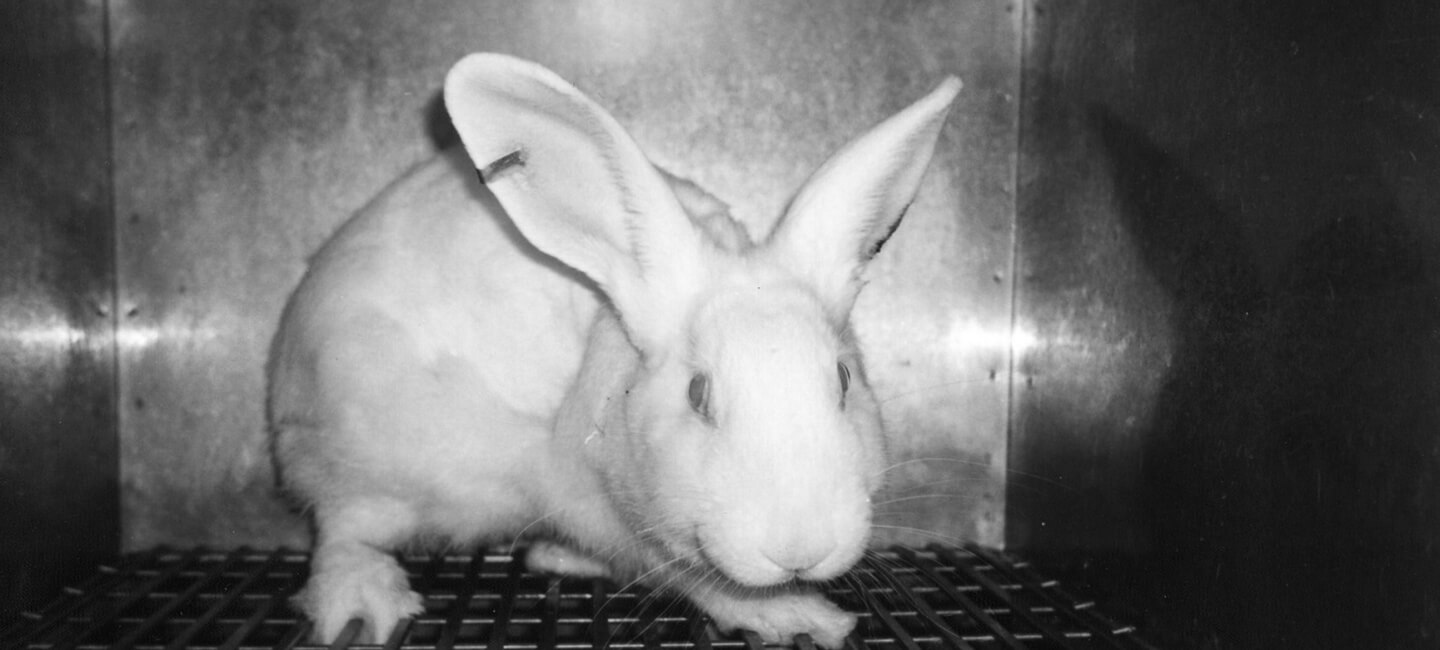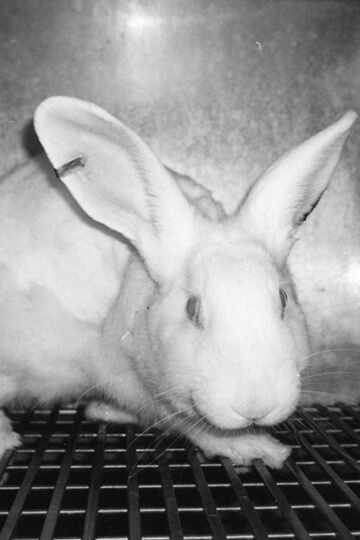

Summer, rest for humans, a nightmare for animals in French laboratories
Having no respite, hundreds of thousands of animals were subjected to painful experiments in French laboratories over the summer. Between July 24 and September 13, 888,218 individuals were included in experimentation projects approved by the authorities in France. No species was spared. We’re calling for a real wake-up call that will enable these practices to evolve. For this, we need your help!
As usual, the figures are – sadly and revoltingly – overwhelming: 738,444 mice, 396 monkeys, 7,977 pigs, 175 cats, 85 horses, 1,571 dogs, 222 ferrets, 45,154 rats, 14,474 birds and 4,537 rabbits have been or will shortly be used in experiments, some in conditions of extreme suffering.
The following projects have been published in the database listing projects authorized at European level:
Rodents always on the frontline…..
Rodents, in particular mice and rats, make up the majority of animals used in these experiments. Of the 888,218 animals used, 738,444 mice, 45,154 rats and 1,480 guinea pigs were used in various projects. Here are a few examples:
As part of research into kidney failure, 400 mice were deprived of blood circulation to their kidneys, causing severe pain and a rapid deterioration in their general condition. They were then killed.
Another study subjected 320 rats to heart attacks, followed by implantation of a heart patch, all accompanied by intense pain and stress.
The suffering doesn’t stop there: 14,160 mice were injected with tumor cells, leading to the development of tumors.
In another project, 2,950 mice were used in behavioral tests for deafblindness, including the “swim test”, where they are forced to swim under stressful and desperate conditions, a practice that we have been fighting for years.
1,290 mice will also undergo brain and spinal cord surgery for virus injection, before being subjected to chronic pain caused by mechanical compression of the sciatic nerve. This experiment, which presents a high risk of infection, imposes prolonged suffering on these animals.
As for the 828 rats and 4,140 mice, they underwent invasive surgeries, such as constriction of the facial nerve, generating severe pain.
In a study designed to investigate air pollution, 700 mice, including pregnant females and pups, were exposed to pollutants including cigarette smoke and an oxygen-depleted atmosphere (only 85%). The result was severe pain, starting at an early age.
In another project, 900 rats will undergo surgery and electric shocks to inflict severe pain.
1,696 baby mice will receive several transcranial and intracerebral injections. The project states that “handling the baby mice can sometimes cause the females to reject their offspring”…
In addition, 84,000 mice will undergo one or more biopsies before being reused in other projects. However, if they do not carry the requested genotype, they will be killed. In another similar project, 50,000 mice will undergo sampling. Here, the project specifies that if “the animals whose DNA sequences are not those expected (genotype of no interest to the project leads), [they] will be put to death (around 30%, or 15,000 mice)”. This “disposable” approach to animal lives demonstrates the coldness with which these individuals are treated, as interchangeable scientific tools.
In another project, 540 mice and 500 rats underwent kidney removal to induce acute renal failure, a procedure accompanied by intense pain and serious risks of infection. This cruel treatment, meant to simulate human diseases, once again highlights the suffering inflicted.
2018 immunodeficient mice were also injected with human immune cells. Some of them were then grafted with tumor cells, leading to the development of tumor masses on their flanks, before being killed.
Finally, 14,400 mice will undergo force-feeding and intraperitoneal and intravenous injections before being killed.
…..but no species is spared
Concerning monkeys :
396 monkeys were subjected to experiments of all kinds. Of these, 12 were infected with hemorrhagic fever virus and underwent abdominal implant surgery to measure body temperature. Pain was classified as severe. In another project, 182 monkeys were operated on, with terrible consequences: stress, loss of balance, transient facial paralysis. All will be killed.
Concerning dogs and cats:
As part of staff training, 160 cats and 140 dogs were used for “training, handling, restraint, administration of substances, blood sampling […] anesthesia and euthanasia”. Of these animals, 20 cats and 20 dogs were killed, while the others were subjected to pain, stress and abnormal behavior: they are transformed into training tools.
In another project to test vaccines, 370 dogs were killed after experiencing severe clinical symptoms, such as vomiting, diarrhea and intense stress.
Concerning pigs:
In a project dedicated to research on badly burned persons, 10 pigs were burned in several places on their bodies before receiving skin autografts. The level of pain was so intense that it was classified as “pain of severe severity”.
In addition, many projects involve subjecting hundreds of pigs to cardiorespiratory arrest, with heat and physical stress and severe suffering.
Other species less present but just as much sacrificed:
This summer, 222 ferrets were also used in experiments, 30 of whom had cranial devices implanted, putting them at risk of infection.
Fish were not spared either: to capture them, 183 were paralyzed by electric shock before being exposed to lethal chemicals. “Electric fishing”, denounced by One Voice for years, continues to be practiced under the guise of research.
The transition to animal-free science is massively supported by the French (Ipsos/One Voice poll, April 2023), by nearly 150 European scientists from 19 member states, by European elected representatives in 2010 and 2023, and by French parliamentarians.
By continuing to authorize these practices, the State remains complicit in a system that inflicts unbearable suffering on millions of animals every year. It is urgent to re-evaluate these methods and accelerate the transition to animal-free alternatives. We call on laboratories to systematically favor alternative methods, in accordance with the law, and encourage professionals to train in animal-free testing. In addition, we call on politicians to support increased funding for research into these alternatives. Although the principle is widely accepted, it is crucial to have a strong political will to move forward, as standing still slows down progress. An innovative approach and additional investment are needed.